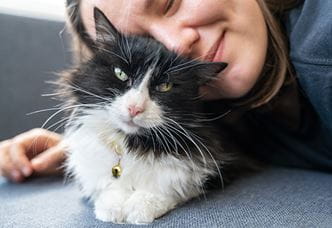
Ringworm can find its way into your home by bringing in a new cat, allowing your cat to interact with other cats, letting your cat go outside or working with animals yourself.
The lesion isn’t always ring-shaped, and it’s not a worm
Ringworm is named for the circular lesion that’s found on people, but it’s actually a contagious fungal infection of the skin and hair. On cats, you’ll usually see one or more crusty areas of hair loss with scaling of the skin. Ringworm can appear anywhere on the cat’s body, but the head, chest and limbs are common. Make sure to check those ear tips, toes and along the lip margin! The fungal organisms responsible for ringworm belong to a group called dermatophytes, so ringworm is sometimes called dermatophytosis.
From your young cat to you…
Ringworm can spread between cats, people and dogs through direct contact with the infected animal or person. It can also be spread through contaminated objects. For example, if you brush a new kitten who has ringworm and then brush your cat, you can transmit ringworm between the two cats. If you pet a cat with ringworm, you can get ringworm yourself. Ringworm is hardy and can live in the environment for around a year and a half, so cleanup is important!
Could it be something else?
Crusty areas of hair loss can certainly occur due to other conditions, like overgrooming or allergies, and diagnosis of ringworm isn’t always straightforward. The veterinarian may use a special ultraviolet lamp called a Wood’s lamp to see if the area glows. If the area glows, it’s usually a pretty solid diagnosis, but unfortunately, not all cases will. Taking a culture sample is the most effective way to diagnose ringworm, but it can take 2 to 3 weeks for results. In the absence of another obvious cause, your veterinarian may treat the ringworm while waiting for results.
Eliminating ringworm infection
To eliminate a ringworm infection, you need to treat both the affected animal and the environment. Your young cat will likely be started on topical antifungal creams or shampoos, and the veterinarian may prescribe oral antifungal medications to be given by mouth. Minimize contact between infected and noninfected animals. It’s recommended to vacuum all rooms and mop hard floors. Speak with your veterinarian about using bleach for decontamination.
Ringworm can resolve on its own over time, but this can take several months. During that time, your young cat can continue spreading ringworm to other pets, children and people in the home.
Contact your VCA care team if you think your kitten could have ringworm. If you’re noticing red, circular, itchy lesions on yourself or human family members, contact a medical professional.
Learn more about the different types of internal parasites that could affect your young cat.





